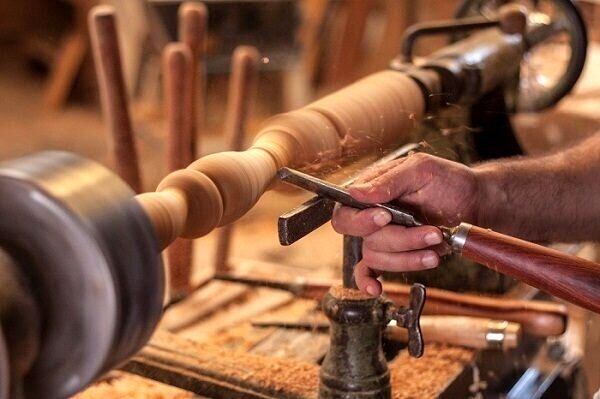Traditional woodturning revived in northeast Iran

TEHRAN – Great efforts paid off in a northeastern Iranian village where local crafters have succeeded in reviving traditional skills of woodturning, which were once on the verge of oblivion.
“For thousands of years the art of woodturning has been popular in Torbat-e Heydarieh, but it had fallen into neglect in recent years,” tourism chief of the village, Ali Mohammadi said on Wednesday.
However, the forgotten handicraft has been brought back to life with a great deal of effort made by a young artisan couple, who set up a woodturning workshop in the city, the official added.
Their workshop currently employs some 10 crafters who export their handmade products to neighboring countries and Europe, he noted.
Woodturning refers to the act of shaping wood using horizontal wood scraping rotational machines to build products like sofa legs, bowls, plates, etc. A woodturning artist is a person who is able and skilled in regulating the woodturning machine, selecting the appropriate wood, and shaping and finishing the wood.
With 14 entries, Iran ranks first globally for the number of cities and villages registered by the World Crafts Council, as China with seven entries, Chile with four, and India with three ones come next.
The value of Iran’s handicrafts exports stood at $120 million during the first eleven months of the past Iranian calendar year 1399 (March 20, 2020 – February 18, 2021), Mehr reported. The country’s handicrafts exports slumped during the mentioned months in comparison to the same period last a year earlier due to the damage the coronavirus pandemic has inflicted on global trade.
The Islamic Republic exported $427 million worth of handicrafts during the first eleven months of the calendar year 1398. Of the figure, some $190 million was earned via suitcase trade (allowed for customs-free and tax-free transfer) through 20 provinces, according to data compiled by the Ministry of Cultural Heritage, Tourism and Handicrafts.
Ceramics, pottery vessels, handwoven cloths as well as personal ornamentations with precious and semi-precious gemstones are traditionally exported to Iraq, Afghanistan, Germany, the U.S., the UK, and other countries.
ABU/AFM

Leave a Comment